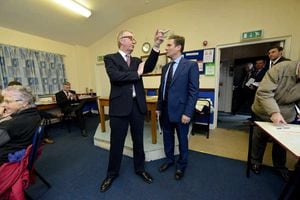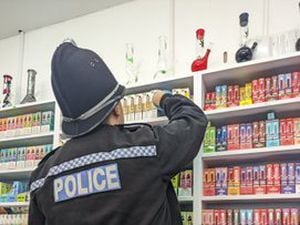Are Labour's immigration talks too little too late?
"I don't think the Labour Party is confused, but I think we need to find a clearer, more coherent approach to immigration."

The words of Sir Keir Starmer, the Labour Party's Immigration Minister and MP for the wealthy central London constituency of Holborn and St Pancras.
Last week Sir Keir, a barrister by trade and one-time QC of the year, hit the road on a three month trek around the country dubbed Labour's Immigration Listening tour.

And his first stop was Dudley.
It's a fair guess that the Upper Gornal Pensioners Club – a stone's throw from the Spills Meadow pub and directly opposite Kent's Tuck In Fried Chicken – was not one of Sir Keir's more typical haunts.
But he arrived there on a wet and windy Thursday afternoon flanked by fellow frontbencher Shadow Home Secretary Andy Burnham and organiser, Dudley North MP Ian Austin.

They were here to meet with club members in a bid to find out what the Great British public think about the myriad of issues surrounding immigration.
It is a simple idea. Our politicians have lost touch with the masses, you see. And the one issue that hovers like a dark cloud over everything else is immigration.
It impacts on our economy, the NHS and our education system. And it is an issue that as far as vast numbers of the public are concerned is not being effectively tackled by our politicians.
"In the last election people didn't trust us on the economy, on welfare, or on immigration," Mr Austin told me before the meeting.
"People won't trust us unless we listen to their concerns. I wouldn't say we have made mistakes on immigration as a party, but we need to engage in an open and honest discussion with local people and take their views on board."
Mr Burnham concurred. "For too long politicians in our London-centric world, have not really been to places like this and really engaged with people," he said. "That's what we're trying to put right."
Halfway through the 1992 election campaign Tory leader John Major took to the streets to get his party's message across.
Announcing his intention to meet voters face-to-face, the Prime Minister hit the road in his campaign bus and descended on towns and cities.
Once there he would produce a wooden soapbox, which he stood on to address voters via a small loud-hailer.
It was a tactic he had learned as a teenager on the streets of South London, where on Saturdays he used to bellow at shoppers from a soapbox near Brixton Market.
No tickets were required, there was no big announcement, Mr Major would simply turn up in places such as Luton or Cheltenham, and start to speak.
It meant that detractors could heckle until their hearts were content, and Mr Major would respond.
At the time his soap-box tour was mocked in the press, but it is now generally viewed as the actions of a politician who was not afraid to tough it out on the streets.
In that year's general election the Tories won by 21 seats with a 7 per cent margin over Labour, with the 14 million plus votes they received marking the highest achieved by any British party in history.
How much of this was down to Mr Major's willingness to get on his box is a matter of conjecture, but the tactic certainly didn't do his party any harm.
Arguably less successful was Harriet Harman's Woman to Woman bus tour, which saw her visit 70 constituencies in a bright pink Ford minibus in the lead up to last year's general election.
The aim was to connect with women who had not voted in the 2010 election, but the campaign received widespread criticism for excluding men.
But it was the van's colour that unwittingly became the central issue.
"Well it doesn't have big eyelashes on the front," Ms Harman said. "We don't care. Actually it's got to look like itself. Because it's new; it's different."
During the tour it quickly became obvious that Ms Harman had got rather tired of being questioned over the van.
"People keep talking about it, but workplace pay, childcare and domestic violence are the key issues here," she told me during a stop off in Wolverhampton.
So Labour's solution is to re-connect with the common man before re-writing party policy.
As Sir Keir himself pointed out at the meeting, you don't find out people's views by sitting around in Westminster.
"Immigration is the big issue of our time," he said. "The refugee numbers last year were a record. This year they are likely to go up, not down and there are more people coming here from the EU than ever before, so it is a big issue.
"So I see this not so much as an exercise in looking back to where we went wrong in the past, but looking forward and saying that since this is such a big issue we have really got to get it right."
This was, of course, a listening tour, and – in what could perhaps harshly be described as a rare trait in politicians – listen they did.
The three MPs stationed themselves at classroom-style tables around the club's main room, which is more accustomed to hosting the Super Slim Slimming Club and meetings of the Gornal and Woodsetton Community Forum.
And the debates raged on.
"They should all speak English if they want to live here," one man opined.
"There's nothing left for those of us who want manual work because the foreigners will do it for less money," said another.
"We get plenty of asylum seekers coming here, but you don't see any in the rich areas," was a commonly heard view, and one that Mr Austin himself has raised in Parliament.
At times the topic of conversation veered away from immigration. The collapse of the British steel industry – described as 'tragic' by Andy Burnham – was brought up on more than one occasion.
Cuts to the armed forces, the failings of G4S and Britain's criminal justice system also came under the microscope.
Mr Burnham, a Europhile who was behind Labour's failed bid to bring in compulsory ID cards when home office minister, put forward a powerful argument for stronger border controls that hit the rights notes with many in the crowd.
He said he would be 'vigorously opposing' cuts to the UK border force, but added: "It is important to remember that the majority of people who come to this country are paying more in than they are taking away.
"One of the main problems when we deal with immigration is that the debate is often conducted on the myths rather than the facts."
The politicians listened intently and gave their views when they were asked for them. Sir Keir was even equipped with a notebook into which he scribed several pages worth of comments.
Such diligence will no doubt serve him well when the tour draws to a close, as the plan is to bring everything together into one coherent document.
At the end of it all Ian Austin, demonstrating some impressive group control techniques that his dad - a former headmaster - would have been proud of, took the floor for a swift recap and feedback session.
The show was over, but what did those in attendance make of it all?
Paul Bartlett – who was at pains to point out that he is 'not inclined to Labour' – said he appreciated the gesture but was sceptical over whether any real change would come from the tour.
"These meetings are a good thing," the 68-year-old from Dudley said.
"But the reality is we can't do anything about immigration until we leave Europe. What Cameron has negotiated is nowhere near enough. I think we will see more and more immigrants coming over here and I doubt Labour will be able to do anything about it."
Mark Richards, aged 41, from Dudley, agreed.
He said: "It was interesting, but there's nothing that any of them can do about immigration anyway.
"There are already too many immigrants in Europe and more are coming. They can't stop free movement.
"When refugees come over they always send them to poor areas like Dudley. I want to see Cameron take more in his constituency, but that's not going to happen."
A beaming Sir Keir, who moved the roadshow on to Oldham on Friday, and will be in Teeside on Thursday, said: "The powerful message coming out from this afternoon has been the lack of long term thinking.
"We came to listen to what people had to say and discuss issues with them. We've heard lost of things we expected to hear, real concerns about people coming to this country and whether they have got the right skills. "This is day one. There's a long way to go."





